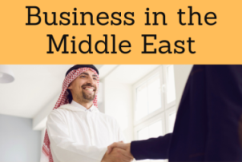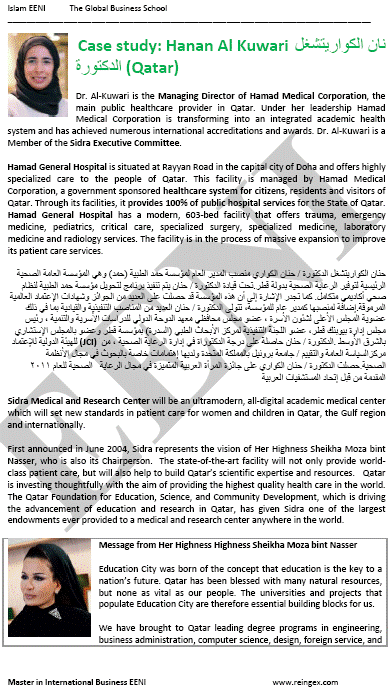Business in Qatar. Qatari Economy, Doha
Qatar: first country by GDP per capita. Foreign Trade, Logistics. Oil Sector

Qatar is the first country in the World by GDP per capita.
Qatar is the international financial centre of the Gulf region
Petroleum, natural gas, and related industries make up most of the Qatari economy
Al- Jazeera (the leading international Arab media communication) headquarters are in Doha
- Introduction to the State of Qatar (Middle East)
- Doing Business in Doha
- Qatari Economy
- Foreign Trade of Qatar
- Transport and Logistics
- Business Opportunities in Qatar:
- Hydrocarbons
- Construction
- Major projects
- Public sector
- Investment in Qatar
- Case Study:
- Hanan Al Kuwari
- Al-Jazeera
- Access to the Qatari market
- Business Plan for Qatar


The educational aims of the Subject “Foreign Trade, Logistics and Business in the State of Qatar” are:
- To analyze the Qatari Economy, Logistics and Foreign Trade
- To conduct research on business opportunities in the State of Qatar
- To explore the Qatari trade relations with the student's country
- To learn about Qatari Trade Agreements
- To examine the profile of Qatari companies
- To develop a business plan for the Qatari market

The Subject “Foreign Trade, Logistics and Business in Qatar” is included within the curriculum of the following academic programs at EENI Global Business School:

Master: International Business.

 Masters adapted to Qatari Students.
Masters adapted to Qatari Students.
- Subject Credits “Doing Business in Qatar”: 1

International Trade, Logistics and Business in Qatar

- China-Pakistan Logistics Corridor
- Kyrgyzstan-Iran Logistics Corridor
- Qatar withdrew from the Ashgabat Agreement

Qatari Preferential Access and Trade Agreements:
- Qatar and the Arab Economic Area
- Gulf Cooperation Council (GCC): Saudi Arabia, Kuwait, Emirates (UAE), Oman, and Bahrain.
- Qatar has trade agreements (as a GCC Member) with China, South Korea, Australia, EFTA, New Zealand, India, Thailand, the EU, Singapore and MERCOSUR
- Islamic Trade Preferential System
- Islamic Centre for Development of Trade
- Greater Arab Free Trade Area (GAFTA)
- Arab Bank for Africa (BADEA)
- SICA (observer)

- World Trade Organization (WTO)
- Agreement on Trade in Services (GATS)
- Agreement on Sanitary Measures
- Agreement on Technical Barriers to Trade
- Agreement on Preshipment Inspection
- Agreement on Safeguards
- Trade Facilitation Agreement
- World Customs Organization (WCO)
- Kyoto Convention
- International Road Transport Union (IRU)
- TIR Convention
- Guidelines on Safe Load Securing for Road Transport
- BIC (Containers)
- International Maritime Organization (IMO)
- Istanbul Convention - not a member
- Customs Convention on Containers - not a member
Qatar is a member of the Cooperation Council for the Arab States of the Gulf

- Arab League
- Summit of South American-Arab Countries
- Asia-Middle East Dialogue
- Islamic Development Bank
- Economic Commission for Western Asia (ESCWA)
- Organization of Islamic Cooperation (OIC)
- Committee for Economic Cooperation
- Islamic Chamber of Commerce
- Islamic Centre for Development of Trade
- Economic Centre for Islamic Countries
- Arab Trade Financing Programme
- Arab Development Funds
- OPEC Fund for International Development (OFID)
- Afro-Arab Cooperation
- Arab Bank for Africa (BADEA)
- Arab Gulf Programme (AGFUND)

- Asia Cooperation Dialogue
- United Nations
- Conference on Trade and Development (UNCTAD)
- International Trade Centre
- World Intellectual Property Organization (WIPO)
- World Bank
- World Trade Organization (WTO)
- International Monetary Fund
The State of Qatar:
- The population of Qatar amounts to 1.5 million people, of whom 83% lives in Doha (Qatar's political capital) and its main suburb Al- Rayyan
- Arabic is the official language in Qatar
- Qatar shares borders with Saudi Arabia
- Abolition of Slavery in Qatar: 1952
- Independence of Qatar from the United Kingdom: 1971
Religion in Qatar: Islam Sunni is the principal religion of Qatar
- Main school of Islamic Jurisprudence is Hanbali
Qatar belongs to the Arab Economic Area.
Qatari Economy
- In 2001, Doha hosted the first ministerial-level meeting of the Doha Round of the World Trade Organization (WTO)
- Qatar is a very open economy
- Qatar produces less than 1% of the world petroleum production
- Crude oil and liquefied natural gas account for 80% of exports of Qatar
- Qatar, like other countries in the Gulf region, is being affected by the international financial and economic crisis, including by the decline in international demand for hydrocarbons, both in quantity and value

International Trade of Qatar
- Total Foreign Trade (imports + exports) related to its GDP stands at 95%
- Main imports of Qatar: the EU, Japan, the United States, Saudi Arabia, and South Korea
- Qatar Exports mainly to Japan, South Korea, Singapore, and the European Union
- The largest Qatari export products are hydrocarbons (petrol and gas), fertilizers and chemicals, and steel products
- The largest Qatari imports are machinery, primary metals, cars and other means of transport, food, chemicals, and building materials
- In the States of Qatar is required to work with a Qatari import agent/Distributor (natural or legal person) who has the exclusive distribution rights for Qatar
Qatar is negotiating other Free Trade Agreements with the United States, Japan, and Australia. Qatar also has signed economic agreements with France, Germany, Romania, China, Senegal, India, Cuba, Switzerland, Finland, and Turkey.
(c) EENI Global Business School (1995-2025)
Top of this page








 WhatsApp
WhatsApp
 or
or 
